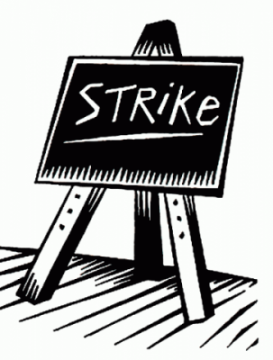Solidarity with School Strikes in England and Wales
The NEU have overcome restrictive anti-union laws with planned strike action to happen over 7 days in February and March. Although 88% of voters said yes to strike action, oppressive laws mean that teachers and support staff had to be balloted separately. Additionally, members in England also had to be balloted separately to those in Wales. And on top of that, each ballot needed greater than 50% turn out to be lawful. The result was that teachers and support staff in Wales met the statutory requirements to strike; in England, teachers did but support staff did not. These legal barriers are there to diminish the effectiveness of workplace organising as industrial action is a direct threat to state interests and worker exploitation.
SolFed and its Education Union (SFEU) stand in solidarity with these strikes and encourage anybody working within or interacting with the education sector to refuse to cross picket lines.
Some of the strike days are restricted based on nationality or district – so any individual school will only be affected by 4 out of the 7 days of action. While longer and more courageous action would be welcome, the first national strike date on 1st February has been coordinated to align with strikes by ASLEF, RMT, PCS and UCU. Furthermore, there will be rallies happening across the country on the same day in opposition to proposed legislation to restrict the right to strike.
Teacher and support staff pay has been reduced in real terms for over a decade, while in the private sector the ownership class continue to extract wealth from workers’ labour in the name of profit. Analysis by Unite shows that “profit margins for the UK’s biggest listed companies were 73% higher in 2021 than pre-pandemic levels in 2019”. Yet, the UK state continues to facilitate this exploitation while underfunding and privatising parts of the public sector. For support staff, Unison found that the move from yearly to term-time only contracts resulted in a pay cut of up to 20% in 2015. Now, the NEU states that teachers pay has been cut by 23%, and support staff pay cut by 27% in real terms since 2010. Additionally, the IFS found that between 2010 and 2020 schools have received a real terms funding cut of 9% per pupil. Moreover, a third of teachers that qualified between 2011 and 2020 have already left the profession – that’s 81,000 teachers. This has led to a chronic staff shortage. Unfortunately, in the face of these pay and funding cuts, the staff that remain often feel the need to work outside contracted hours and often pay for school resources out of pocket.
Although the education system in the UK is hardly a demonstration of democratic values and autonomy – these cuts do mean less resources for pupils, fewer staff, less training and ultimately declining education standards.
Syndicalist union organising among education workers, with a focus on larger and more persistent strike action, is needed more than ever. Unofficial wildcat strikes which can start without giving notice to the employer are a highly disruptive, though not legally protected, form of action. Withdrawing labour indefinitely until strike demands are met can be another effective approach. Secondary industrial action in sympathy with other workplace strikes could pave the way to a general strike, and better material conditions for all. On non-strike days, staff can refuse to work outside contracted hours and refuse to take on the job responsibilities of higher pay grades. Solidarity among workers leads to substantial gains against capitalist exploitation. We urge workers to join our unitary union, SFEU, which brings workers together across traditional workplace divides. Among our Higher Education members, for example, we have admin staff, postdocs, students and professors. This is they key to our strength as workers. Join the syndicalist SFEU!
adapted from http://solfed.org.uk/bristol/bristol-sf-solidarity-message-with-striking...
Other Posts
| Higher Education Marketisation - What did they expect!? (posted 6. March) |
| SFEU Marketisation of Higher Education statement (posted 11. July) |
| Humanities under attack in HE (posted 12. March) |
| Marking and Assessment Boycott in Higher Education keeps pressure on employers (posted 25. July) |
| Business as Usual for the NEU, GMB, Unite and Unison (posted 19. June) |
